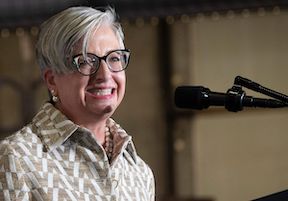United Parcel Service Inc.’s Chief Executive Officer Carol Tome seems to have cracked the e-commerce conundrum.
A steady rise of residential packages powered by e-commerce growth had been eating away at margins for UPS and rival FedEx Corp. More profitable business deliveries have slipped to less than 40% of UPS’s volume from more than half only a few years ago.
But Tome, who took the helm in June 2020, has been building margins back up by aggressively raising prices, shifting focus to small businesses from large customers who command discounts and using technology to boost efficiency.

The result? UPS in 2021 logged its highest profit margin in 14 years. And now the Atlanta-based company has laid out financial targets for this year that previously had been seen as out of reach until 2023.
FedEx hasn’t yet turned the corner on e-commerce, posting annual operating margins of less than 8.5% since 2014 as the company has spent heavily pursuing sales growth without focusing as closely on margins.
“We’re focusing on things we can control,” Chief Financial Officer Brian Newman said in an interview Tuesday after UPS reported earnings. “What we can control is the revenue quality—and we’re driving very good revenue quality—costs and productivity.”
The company’s new nimbleness came into play during the holiday season when deliveries unexpectedly surged in October and November and then declined in December. Still, UPS’s domestic business logged a fourth-quarter profit margin of 12.2%, up from 8.8% a year earlier.
“We returned a lot of rental equipment to bring the cost down and we peeled back on the labor,” Newman said. “We were able to manage quite nicely and deliver a tremendous margin improvement despite the lower volume in December.”

Follow us on social media: